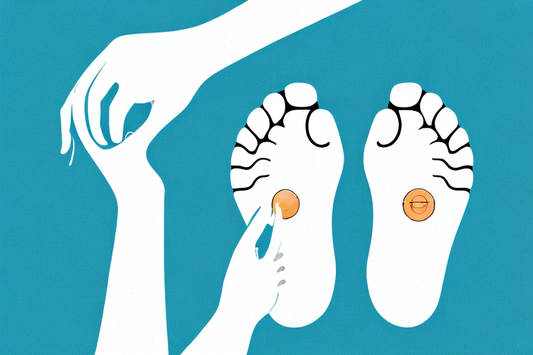
Top 5 Home Remedies for Managing Neuropathy Symptoms
If you or a loved one suffer from neuropathy, you know firsthand the impact it can have on daily life. From painful tingling sensations to numbness in the extremities, neuropathy symptoms can be difficult to manage. Thankfully, there are several home remedies that can help alleviate symptoms and improve quality of life. In this article, we’ll explore the top 5 home remedies for managing neuropathy symptoms.
Understanding Neuropathy
Neuropathy is a nerve disorder that can affect any part of the body. The condition is characterized by damage to the nerves, which can cause a range of symptoms, including tingling, numbness, and weakness in the affected area. Neuropathy can be caused by a variety of factors, including diabetes, chemotherapy, and certain medications.
What is Neuropathy?
Neuropathy is a condition that affects the nerves in the body. It can cause damage to the nerves, which can result in a variety of symptoms. The symptoms of neuropathy can vary depending on the type and location of the nerve damage.
There are many different types of neuropathy, including peripheral neuropathy, autonomic neuropathy, and focal neuropathy. Peripheral neuropathy is the most common type of neuropathy and affects the nerves that control sensation and movement in the arms and legs. Autonomic neuropathy affects the nerves that control the body's automatic functions, such as heart rate, blood pressure, and digestion. Focal neuropathy affects a specific nerve or group of nerves, causing weakness or pain in a specific area of the body.
Common Causes of Neuropathy
Diabetes is one of the most common causes of neuropathy. In fact, it is estimated that up to 50% of people with diabetes will develop neuropathy at some point in their lives. Other common causes of neuropathy can include chemotherapy treatment, alcohol abuse, and certain medications.
Chemotherapy-induced neuropathy is a common side effect of chemotherapy treatment for cancer. The chemotherapy drugs can damage the nerves, causing symptoms such as tingling, numbness, and pain. Alcohol abuse can also cause neuropathy, as alcohol can damage the nerves over time. Certain medications, such as those used to treat HIV/AIDS and epilepsy, can also cause neuropathy.
In some cases, neuropathy may be inherited or idiopathic, meaning its cause is unknown. Hereditary neuropathies are rare and usually begin in childhood or adolescence. Idiopathic neuropathy is more common in older adults and can develop gradually over time.
Symptoms of Neuropathy
The symptoms of neuropathy can vary depending on the type and location of nerve damage. Common symptoms may include tingling or burning sensations, numbness, weakness, and pain. For some individuals, neuropathy can also cause digestive issues, sexual dysfunction, and difficulty with balance and coordination.
Peripheral neuropathy can cause a loss of sensation in the hands and feet, making it difficult to feel hot or cold temperatures or to detect injuries. Autonomic neuropathy can cause a variety of symptoms, including dizziness, nausea, and constipation. Focal neuropathy can cause weakness or pain in a specific area of the body, such as the wrist or foot.
If you are experiencing symptoms of neuropathy, it is important to see a healthcare provider for an accurate diagnosis. Treatment options for neuropathy may include medication, physical therapy, and lifestyle changes.
The Importance of Managing Neuropathy Symptoms
Neuropathy is a condition that affects the nerves in the body, causing pain, numbness, and tingling sensations. It can be caused by a variety of factors, including diabetes, chemotherapy, and certain medications. While there is no cure for neuropathy, managing symptoms is crucial for maintaining a good quality of life.
Impact on Daily Life
Neuropathy can significantly impact daily life, making it difficult to perform routine tasks or enjoy hobbies and activities. For example, individuals with neuropathy may struggle to walk or stand for long periods of time, making it difficult to run errands or attend social events. The condition can also lead to anxiety, depression, and social isolation, as individuals may feel limited in their ability to participate in activities they once enjoyed.
However, by working with healthcare professionals to manage symptoms, individuals with neuropathy can learn strategies for coping with pain and maintaining mobility. This may include physical therapy, medication, or lifestyle changes such as exercise and a healthy diet.
Preventing Complications
Left untreated, neuropathy can lead to complications such as foot ulcers, infections, and even amputation. Therefore, it’s important to manage symptoms and prevent further nerve damage. Individuals with neuropathy should take care to inspect their feet regularly for signs of injury or infection, and work with healthcare professionals to manage blood sugar levels if they have diabetes.
In addition, individuals with neuropathy should be cautious when using hot or cold temperatures, as they may not be able to feel extreme temperatures as well as others. They should also take care when using sharp objects, such as knives or scissors, as they may not be able to feel when they have been cut.
Improving Quality of Life
By managing neuropathy symptoms, individuals can improve their quality of life and reduce the impact of the condition on physical and emotional well-being. This may include participating in activities that are enjoyable and fulfilling, such as hobbies, social events, or spending time with loved ones.
It’s important for individuals with neuropathy to work with healthcare professionals to develop a comprehensive treatment plan that addresses their specific needs and goals. By taking a proactive approach to managing symptoms, individuals with neuropathy can live full and satisfying lives.
Home Remedy 1: Exercise and Physical Therapy
Benefits of Exercise for Neuropathy
Neuropathy is a condition that affects the nerves, causing pain, numbness, and tingling sensations. Exercise can be an effective way to manage neuropathy symptoms. When you exercise, you increase blood flow and circulation throughout your body, which can help improve nerve function. In addition, physical activity can help with weight management and reduce the risk of other conditions, such as diabetes and heart disease.
Regular exercise can also help improve your mood and reduce stress levels. When you exercise, your body releases endorphins, which are natural chemicals that help you feel good. This can be especially helpful for individuals with neuropathy, as chronic pain can often lead to depression and anxiety.
Types of Exercises to Try
Individuals with neuropathy should focus on low-impact exercises that don’t put excess strain on the feet or hands. Walking is a great option, as it can be done almost anywhere and doesn’t require any special equipment. Swimming is another great low-impact exercise that can help improve circulation and reduce stress on the body. Yoga is also a great option, as it can help improve flexibility and balance, which can be especially helpful for individuals with neuropathy.
It’s important to consult with your doctor or physical therapist before starting any exercise program. They can help you determine which types of exercises are safe and appropriate for your individual needs.
Incorporating Physical Therapy
Physical therapy can also be helpful in managing neuropathy symptoms. A physical therapist can create a customized exercise plan that is tailored to your individual needs and abilities. They can also provide support and guidance throughout the program, helping you stay motivated and on track.
In addition to exercise, physical therapy can also include other treatments, such as massage, heat therapy, and electrical stimulation. These treatments can help improve circulation and reduce pain and discomfort.
Overall, exercise and physical therapy can be effective home remedies for managing neuropathy symptoms. By incorporating regular exercise and working with a physical therapist, you can improve your overall health and well-being, while reducing the pain and discomfort associated with neuropathy.
Home Remedy 2: Dietary Changes and Supplements
Neuropathy is a condition that affects the nerves in the body, causing pain, numbness, and tingling sensations. While there is no cure for neuropathy, there are several home remedies that can help manage symptoms. One such remedy is making dietary changes and taking supplements.
Foods to Include in Your Diet
A healthy diet can improve overall health and may also help manage neuropathy symptoms. Foods rich in vitamins and minerals, such as fruits, vegetables, and whole grains, should be included in the diet. These foods provide essential nutrients that can help support nerve health and reduce inflammation in the body. Additionally, foods high in antioxidants, such as berries and leafy greens, may provide additional benefits. Antioxidants help protect the body from free radicals, which can damage cells and contribute to inflammation.
Some specific foods that may be beneficial for individuals with neuropathy include:
- Spinach
- Kale
- Broccoli
- Oranges
- Bananas
- Avocado
- Brown rice
Foods to Avoid
Individuals with neuropathy should limit their intake of processed foods and foods high in sugar and saturated fat. These types of foods can worsen inflammation and nerve damage. Processed foods often contain high levels of sodium, which can contribute to fluid retention and swelling, making neuropathy symptoms worse. Additionally, foods high in sugar can cause blood sugar levels to spike and then crash, which can exacerbate nerve pain and other symptoms.
Some specific foods to avoid include:
- Soda
- Candy
- Baked goods
- Fried foods
- Fast food
- Processed meats
Helpful Supplements for Neuropathy
Several supplements may be helpful in managing neuropathy symptoms. Alpha-lipoic acid, magnesium, and vitamin B12 are all known to have nerve-protecting properties. Alpha-lipoic acid is an antioxidant that can help reduce inflammation in the body and protect nerve cells from damage. Magnesium is essential for nerve function and can help reduce pain and improve sleep quality. Vitamin B12 is important for nerve health and can help prevent nerve damage and reduce symptoms of neuropathy.
However, it’s important to speak with a healthcare professional before starting any new supplements. Some supplements can interact with medications or cause side effects, and it’s important to make sure they are safe for you to take.
Home Remedy 3: Mind-Body Techniques
Stress Management
Stress can worsen neuropathy symptoms, so it’s important to find healthy ways to manage stress levels. Techniques such as deep breathing, meditation, and yoga can be helpful in reducing stress and improving overall well-being.
Biofeedback
Biofeedback is a technique that involves using technology to monitor the body’s physiological responses, such as heart rate and breathing. By becoming more aware of these processes, individuals can learn to control them, which may lead to improved symptom management.
Home Remedy 4: Massage Therapy
Benefits of Massage for Neuropathy
Massage therapy can improve blood flow and reduce muscle tension, which may be helpful in managing neuropathy symptoms. Additionally, massage can help reduce stress and promote relaxation.
Choosing the Right Massage
Individuals with neuropathy should choose a massage therapist with experience in working with individuals with nerve disorders. Additionally, it may be helpful to opt for a gentle, therapeutic massage instead of a deep tissue massage.
Home Remedy 5: Acupuncture
Benefits of Acupuncture for Neuropathy
Acupuncture is a form of Traditional Chinese Medicine that involves the insertion of thin needles into specific points on the body. The practice has been shown to help reduce pain and improve nerve function in individuals with neuropathy.
Finding an Acupuncturist
When choosing an acupuncturist, it’s important to select someone with experience in working with individuals with neuropathy. Additionally, it’s important to discuss any concerns with the acupuncturist before starting treatment.
Conclusion
While neuropathy can be a challenging condition to manage, there are several home remedies that can help improve symptoms and quality of life. From exercise and dietary changes to mind-body techniques and alternative therapies, there are many approaches to consider. By working with healthcare professionals and developing a comprehensive treatment plan, individuals with neuropathy can achieve better symptom management and overall well-being.




